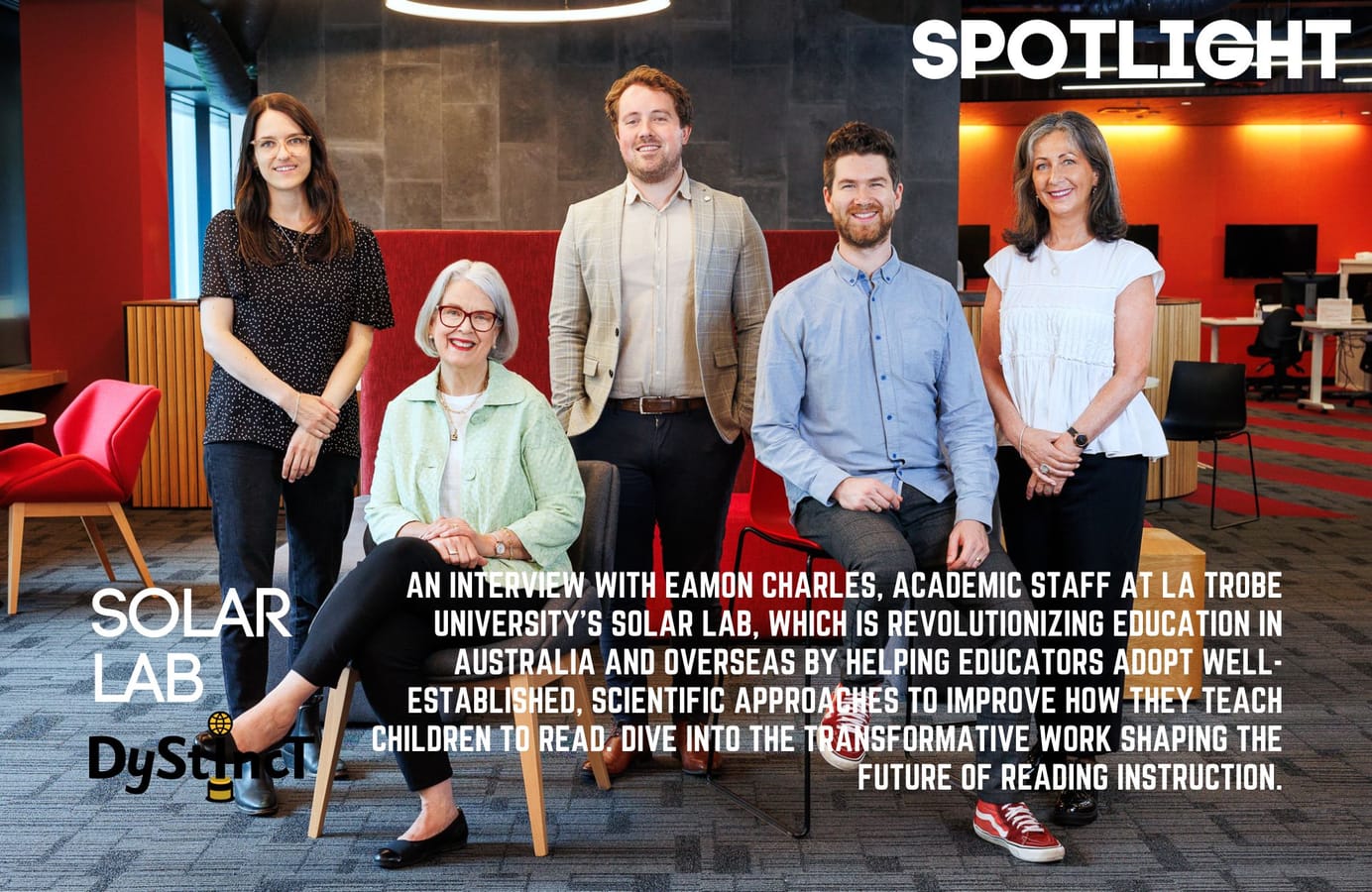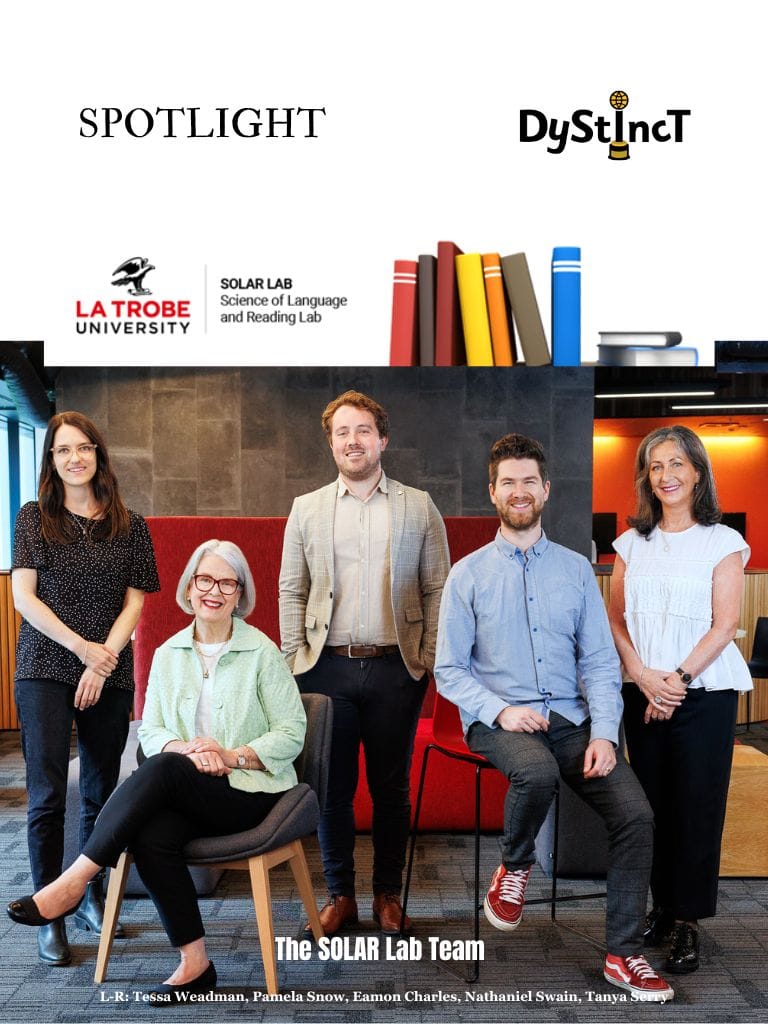
Issue 19: Focus on SOLAR Lab | Eamon Charles
An interview with Eamon Charles, academic staff at La Trobe University’s SOLAR Lab, which is revolutionizing education in Australia and overseas by helping educators adopt well-established, scientific approaches to improve how they teach children to read.

Background
Background
How did the idea for setting up SOLAR Lab come to be? What were Professor Pamela Snow and Professor Tanya Serry aiming to achieve when they founded the SOLAR Lab in 2020?
Professor Snow and Professor Serry's Science of Language and Reading (SOLAR) Lab, founded in 2020, was established with multiple purposes in mind:
- to advance research related to evidence-informed approaches to teaching reading.
- to align La Trobe's relevant undergraduate and postgraduate curriculum with the research.
- And to help schools adopt well-established scientific approaches and improve how they teach children to read.
The idea came about after Snow and Serry spent multiple decades developing their clinical, research and teaching interests, focusing on the most effective approaches to support all learners to develop the oral and written language skills required for academic, economic, and social success across the lifespan. It was made possible by their appointments in the School of Education, which commenced in early 2020.
How has the SOLAR Lab evolved since its establishment, and what key milestones or achievements stand out during its journey?
Since its inception in 2020, the SOLAR Lab has established itself as a highly trusted source of information concerning the effective teaching of reading, writing, and spelling across the primary and secondary years. This has occurred through the development and delivery of highly successful online short courses and the establishment of a Language and Literacy specialisation in the La Trobe Master of Education program. The SOLAR Lab has also grown, with Dr Nathaniel Swain (Senior Lecturer Learning Science and Learning Engagement), Dr Tessa Weadman (Lecturer English Literacy and Pedagogy), and Mr Eamon Charles (SOLAR Lab Academic Intern) joining the team across the last 12 months. Dr Tesa Daffern has also joined as an Honorary Adjunct Associate Professor. The SOLAR Lab has been instrumental in the La Trobe University School of Education becoming a system leader by shifting its curriculum away from Balanced Literacy to one firmly focused on supporting pre-service teachers to build the knowledge and skills necessary to implement evidence informed approaches to teaching reading.
Members of the SOLAR lab team have given invited keynote presentations and have conducted seminars/workshops at multiple local, interstate and international events since the inception of the Lab in 2020. We have also engaged in a large number of podcast interviews, and there has been considerable media interest in our work. Links to podcast interviews are available on the SOLAR Lab website.
Impact and Significance
Impact and Significance
What are some of the significant changes that SOLAR Lab has brought about in the field of education in Victoria and other states of Australia?
We regularly receive feedback from school leaders and teachers about how excited they are that pre-service teachers at La Trobe are now receiving evidence-informed content concerning the teaching of reading. Given the high variance in how reading is taught in Australia, from school to school (and within schools), region to region, sector to sector and state to state, we see the reform of initial teacher education as a critical step to improving student outcomes over the long term. We are proud that La Trobe University and the SOLAR Lab are being recognised nationally and internationally for the leadership we are providing in this space.
Initiatives and Programs
Initiatives and Programs
SOLAR Lab has been offering online short courses and collaborates with various stakeholders. Could you elaborate on the nature and goals of these initiatives?
The short courses are designed to "retrofit" foundational knowledge about the science of teaching reading for participants whose ITE lacked this content. Our short courses focus on content that we believe should have been included in participants' initial teacher education and/ or should be available within systems. We are also highly conscious of the research-to-practice gap, which has long existed in education. While we have long known about the most effective ways to teach children to read, the teaching of reading has unfortunately been a contested space for ideological reasons. Scientific knowledge about reading and reading instruction will continue to evolve over time, but we have enough research and knowledge to act now, which is what we are doing at La Trobe. We are committed to establishing purposeful and long-term partnerships with relevant stakeholders to support schools and systems to apply research evidence at a practical level in the classroom. This focus on sustainable implementation is what will have the biggest impact on student outcomes over time.
Could you provide specific examples of how the SOLAR Lab fosters interdisciplinary collaboration to efficiently translate new knowledge into classroom practice and encourages the de-implementation of practices lacking empirical evidence within the education and allied health sectors?
We have some highly experienced postgraduate students connected to the SOLAR Lab who come from a range of professional backgrounds, including primary teaching, secondary teaching, school leadership, speech-language pathology, and educational psychology. This helps ensure our research outputs have an interdisciplinary focus. Our wonderful postgraduate students all combine their expertise as practitioners with their research skills to focus on work that can inform schools as they transition away from Balanced Literacy to a more structured, explicit and systematic approach to teaching children to read.
Can you share any specific success stories or case studies that exemplify the positive outcomes of SOLAR Lab's initiatives on students, teachers, and/or schools?
We are in the process of writing up a research paper about the impact of our SOLAR Lab short courses and hope that it will be available in 2024. We hear from classroom teachers and school leaders almost every week, feeding back to us on ways they have employed new learnings from SOLAR Lab's short courses and/or the Language and Literacy Masters specialisation to transform instruction in their schools.
SOLAR Lab has engaged in partnerships and collaborations with schools and organisations. Could you highlight some of these partnerships and the mutual benefits they have yielded?
We have just established a major research collaboration with the Australian Education Research Organisation (AERO). Our collaboration with AERO examines the impact of providing school-based coaching alongside online professional learning courses and high-quality resources on teaching practice and student outcomes. Through this study we will examine the overall benefits of coaching, as well as identify which aspects of coaching are most effective. The evidence-informed coaching and online professional learning are targeted at Foundation to Year 2 teachers, education support staff and educational leaders. It will focus on supporting the implementation of structured and explicit early reading instruction in schools moving away from Balanced literacy. We anticipate that the study findings will inform the delivery of resource-intensive professional learning (specifically coaching) at scale. These findings could be used by teachers and leaders, professional learning providers and policymakers to make informed decisions about participating in, organising, and funding professional learning for sustained practice change.
This post is for paying subscribers only
SubscribeAlready have an account? Log in


